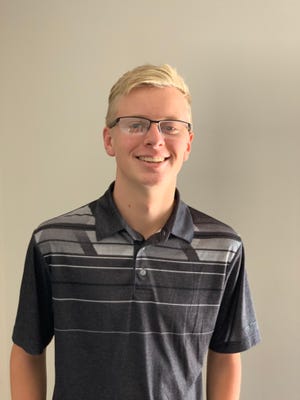FHS senior excited about next step after spending summer on asteroid research project
Bryan Hilton plans to earn doctorate in physics
- Hilton took part in the Summer Science Program, a nonprofit organization that runs a residential enrichment program designed to challenge and inspire high school students from around the world.
- He was part of a group of 35 students who tracked a near-earth asteroid.
- The program is normally residential, but was done on a virtual basis this summer.

FARMINGTON — Farmington High School senior Bryan Hilton spent much of his summer vacation participating in a science program through which he helped track a near-earth asteroid and calculate its chances of striking the planet.
But if you think he lies awake at night worrying about the possibility of Earth being wiped out in an "Armageddon"-style collision with a space rock, think again.
"No, definitely not," Hilton scoffed, dismissing the idea.
The 16-year-old has other things on his mind these days, including submitting college and scholarship applications so he's prepared for his next step when he graduates in May.
But the experiences Hilton enjoyed over five weeks this summer through the Summer Science Program — a nonprofit organization that runs a residential enrichment program designed to challenge and inspire high school students from around the world — made a strong impression on him. Although the residential aspect of the program was put on hold this year because of the COVID-19 pandemic, Hilton still was able to take advantage of its primary offerings, including participating in the asteroid research project and watching frequent virtual lectures by distinguished scientists.
"The thing that really made me interested in it, even though it was virtual, was it still was kind of a hands-on experience," Hilton said. "We were working with professors and real data and teams of students."
Read more: Farmington schools student tests positive for COVID-19
Hilton was part of a group of 35 other students who applied for and were accepted to the program this summer. From June 21 through July 25, they spent more than 300 hours collecting and analyzing data from a research-grade telescope, according to a press release from the Summer Science Program. Since the program was virtual, the students had to rely on data collected by other researchers, but Hilton said the experience was still very meaningful.
"The only part we didn't get to do was use these telescopes ourselves," he said. "But we did take the raw data and process it. That was really cool."
Working in teams of three that were overseen by experienced researchers, the students calculated an orbital path for the asteroid and tried to determine its chances of colliding with Earth in the future.
Hilton said the asteroid his team worked on was approximately 0.16 astronomical units from the Earth — an astronomical unit is the mean distance from the center of the Earth to the center of the sun — and turned out to be benign.
"It's not (close) enough to classify as a potentially hazardous object," he said, sounding a little disappointed.
The program also included regular virtual lectures that Hilton found fascinating, including two by Nobel Laureates, physicist Eric Cornell and oncologist James Allison. The subjects ranged from artificial intelligence and general relativity to physics and cosmology.
Hilton said the lectures were one of his favorite parts of the whole experience.
"There was even someone who helped build a spacecraft that went to Jupiter and someone who worked on a Mars rover," he said.
Hilton said he had great expectations for the program before the summer began, and the experience did not disappoint.
"Honestly, I learned everything I thought I would learn (over the course of the summer) in the first week," he said. "I definitely recommend it for anybody interested in going into research astrophysics or biochemistry."
While he would have preferred to be able to take part in a residential program, Hilton said the alternative program this summer was a good response to challenging circumstances.
"They did a great job of making the virtual experience very informative," Hilton said, adding that he also got to know his teammates very well throughout the process.
That chance to interact with like-minded people was invaluable, he said.
"My favorite part was that I learned to collaborate with other researchers," Hilton said. "I just learned a lot."
The program offers several follow-up advantages, he said, explaining that he requested and was assigned a mentor who once participated in the program himself — a graduate student at the Massachusetts Institute of Technology who is advising Hilton on college research opportunities.
Hilton plans to attend Brigham Young University for his undergraduate studies, then move on to MIT or the California Institute of Technology for his graduate-level work. His goal is to earn a doctorate in physics and carve out a career in the experimental field.
"I don't have it completely narrowed down," Hilton said, but he noted there are Summer Science Program alums working at NASA, SpaceX, the Jet Propulsion Laboratory, Los Alamos National Laboratory and at research institutions around the world — so the possibilities are numerous.
"Working at one of those would be great, but I think working at one of the start-up firms would be great, too," he said.
For information about applying to the Summer Science Program, visit summerscience.org.
Mike Easterling can be reached at 505-564-4610 or measterling@daily-times.com. Support local journalism with a digital subscription.